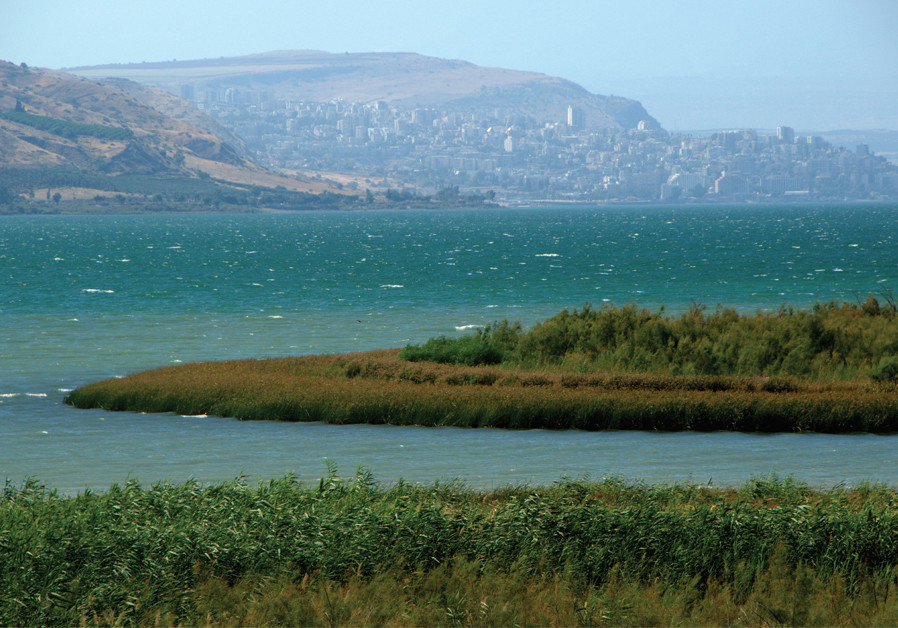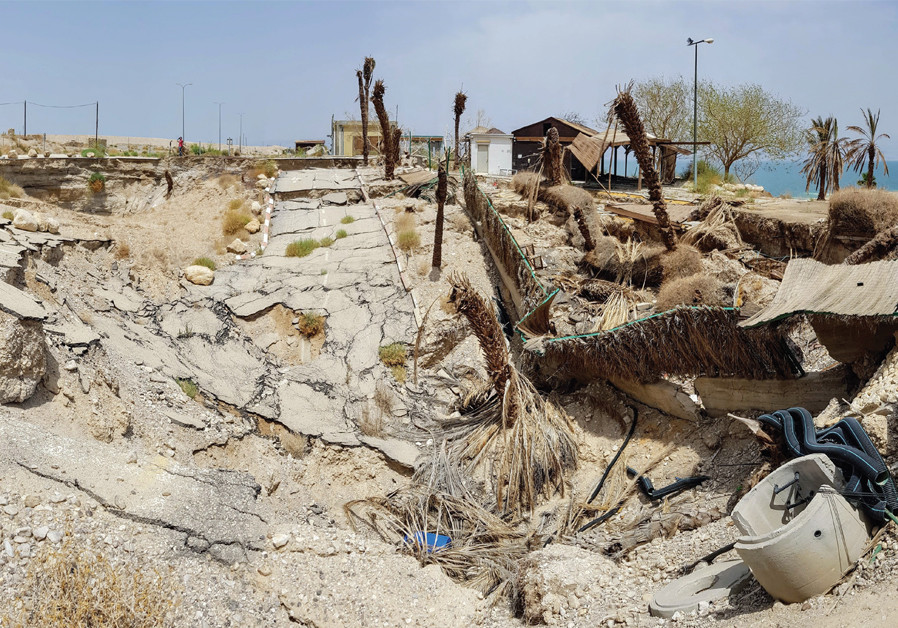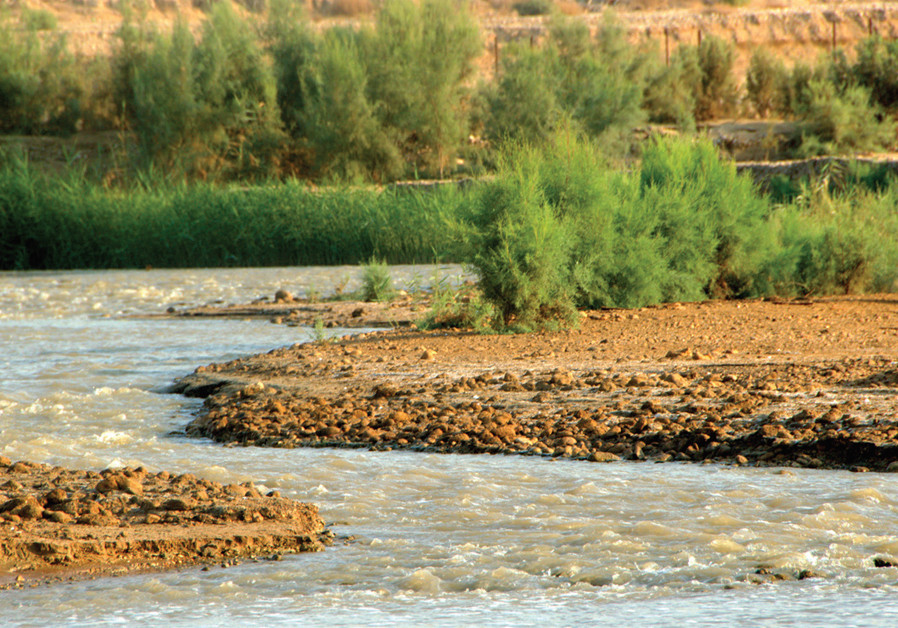
‘WE CANNOT “Save the Dead Sea” if we do not rehabilitate and fill up Lake Kinneret’ (pictured).. (photo credit: NOAM BEDEIN)
Noam Bedein – ‘Saving the Dead Sea’ one drop at a time
Israeli water diplomacy: A path towards Israel’s normalization in the Middle East and the world.
‘Take one-minute-shorter showers” was the message I delivered to third to eighth graders in Saul Mirowitz Jewish Community School in St. Louis, Missouri, teaching about the environmental aspects of the Dead Sea.
What does water conservation education in the US have to do with saving the Dead Sea on the other side of the world, one might ask?
A lot!
“Water stressed conditions” can affect up to two-thirds of the world in less than a decade, according the World Bank. According to the American Government, 40 out of 50 states in the US are expected to experience water shortage by 2025. The UN General Assembly announced last December that the water crisis, affected mainly by population growth and climate change, is one of the main issues to be dealt with in the planning period up to 2030. Even countries that have traditionally had plentiful water resources are becoming water-stressed, as I saw in my travels in Denmark this past summer 2018.
The rapidly disappearing Dead Sea presents a particularly dramatic challenge on the world scene. This body of water is one of the greatest natural wonders of the world, located at the lowest point on earth. It is steeped in history, religion, culture and healing traditions. And it has scientific value in a wide range of fields of study. At the same time it is a part of a large network of Middle Eastern water treasures that are under serious stress, just as so many other water systems all over the world are. Moreover, rich minerals mined from it support 25% of the world’s agriculture, feeding over one billion people; the mining can only continue if the Dead Sea’s water levels are adequate.
Conservation of water is important and will only become more so. However, it is also important to heal, restore and expand water sources. And Israel is a world leader in developing and implementing large, advanced technological water solutions for both approaches. Israel also knows that success requires strong diplomatic relations with neighboring countries and with the general public in order to rehabilitate, preserve and manage water sources, using methods in the best possible harmony with nature-based solutions for water stress. Success in managing the health of the Dead Sea could not only become a model for many other projects, but also a path toward appreciation of Israel’s position in the Middle East (did someone say “normalization”?).
(A sinkhole swallows a parking lot at Mineral Beach. (photo credit: NOAM BEDEIN)
Connecting the dots
On my recent trip to the US, sponsored by St. Louis Friends of Israel, I was asked to speak as the founder and director of The Dead Sea Revival Project at Mirowitz school and to the Jewish community.
It was a perfect time to speak on this topic, right after the High Holy Days and one day after Simhat Torah, where Jews all over the world have began their daily prayers for rainfall.
My presentations are rooted in two and a half years’ time-lapse documentation of the dramatic changes connected to the receding water levels of the Dead Sea – Israel’s Wonder of the World. This documentation has a unique emotional effect, coupling the frightening images of ecological disaster with the images of beauty and magic, not only in and around the Dead Sea, but more generally in the Land of Israel. It provides a powerful tool for inspiring and influencing a new generation.
An additional layer is added with the personal lessons about what each of us can do as individuals to take more responsibility to conserve water, when taking a shower, brushing our teeth, washing dishes and so on.
Connecting the youth from their personal lives – and to the micro environmental story of the Dead Sea using arts of visuals, I also connect them to the macro global cause of evaluating our world’s water sources, identifying their own water treasure they would help to preserve and heal, not only as individuals, but as a community.
This building of mental and emotional connections is also my own story. I started by focusing on our water treasure at the lowest place on Earth, moved outward to the entire water system that the Dead Sea is a part of, and inward to my personal responsibility. I’ve reached a new level of water consciousness and evaluation, learning not only about Israel’s water challenges, but also of those being faced by Israel’s neighbors in the Middle East and around the world. Long years of droughts make it increasingly harder to meet the water needs of growing populations. While working to mitigate climate change, the world also needs to reduce its consequences by reducing water usage, recycling, not using potable water for non-drinking purposes, desalination (in more environmentally friendly ways than currently) and improving the health of the natural supplies of water.
Middle Eastern politics
Learning over the years about the complexities made me realize the potential and value this issue has for stability in the Middle East. And working on solutions can and should involve sending a message to a world that is experiencing conflicts over water sources and water use.
Water has always been a cause for war throughout history and especially in the Middle East.
Many experts will say that the six-year-plus Syrian civil war has been the main cause of water shortage for hundreds of thousands of farmers in Eastern Syria, who have been hard hit by the depletion of water available for farming – due both to climate change and to the lack of water pumping supervision. Israel has experienced five years of drought, but the rest of the Middle East has been experiencing a decade of droughts. The three main, mighty rivers that have been flowing for thousands of years in the Middle East – the Tigris, Euphrates and Nile – have been almost dried out in the first time in recorded history. Iran is experiencing the worst suffering from water shortage compared to other Middle East countries.
And a major cause of the massive migration from Africa to Europe is lack of usable water.
The Dead Sea is already an arena for cooperative problem-solving. Jordan has the fourth least drinking water per capita of all countries in the world, and 1.5 million Syrian refugees have added to the water demand in the past few years. In Amman, Jordan’s capital, there’s running water in the tap only once a week. The Red Sea to Dead Sea Canal project between Israel, Jordan and the PA, is currently a highly visible platform to increase international stability in the Middle East today. This is the main reason that the World Bank has granted $10 billion for the largest facilities in the world for water desalination. In reality, the main purpose of the “Red-Dead” canal is to provide the kingdom of Jordan with desalinated water for drinking. It’s a little hard to expect Jordan to focus on preserving our common heritage when people don’t have water to drink.
So the mention of the Dead Sea in this project is more symbolic than real. But still, the project could contribute up to about 10% of the additional water flow to the Dead Sea that is needed to stabilize the water level. So while there are many critics of the project, rather than rejecting it, it would make more sense to exploit its practical, technological, political, and symbolic potential as part of the total effort.
THE WRITER warns that historical incoming water flow is drying out, as the Jordan River (pictured) has almost completely dried out and Lake Kinneret water levels have never been lower. (photo credit: NOAM BEDEIN)
The broader picture
The main reason for the receding water levels of the Dead Sea (up to 70%) is that the historical incoming water flow is drying out. The Jordan River has been dried out almost completely and the water levels of Lake Kinneret (the Sea of Galilee) have never been lower. The water is becoming ever more salty and ecological disasters are unfolding.
Therefore, we cannot “Save the Dead Sea” if we do not rehabilitate and fill up the Kinneret, secure and restore the water sources, open up the dams and have water flow naturally through the Jordan River to eventually reach the Dead Sea. Israel is now talking about switching the current national carrier to bring water back into the sea as well as building two more desalination plants for Northern Israel in the next decade.
But in the big, global picture, the technologies of climate change mitigation and improving water supplies are far from enough. The other major component has to do with water demand. Effective water management requires technological, cultural, political and economic interventions to get the most value out of every drop of water used, including but not limited to recycling.
Israel has finally stopped pumping water from the Kinneret. On the Jordanian side of the Jordan River, there are over 1,000 pirate pumps that drain the river along with one of its sources – the Yarmuk River. There is also pirate Syrian pumping for drinking water and agriculture. There’s no supervision or functioning management of government over these water sources.
While there is always room for improvement, there is no country even close to Israel’s level of water management. Israel recycles up to 90% of its water, the next country is Spain with 25%. The most advanced state in the US, California, recycles only up to 5% of its water. There are almost no leaks in Israel’s water systems. In contrast, 25% to 30% of London’s water is wasted. In New York City, 35 million gallons of water are wasted every day because of leaks.
So Israel can – and should – use “water diplomacy” to assist neighboring countries to create proper management for securing and preserving water sources that also feed rivers in Israel, and eventually help not only to save the Dead Sea, but also to deal with water crises all over the world.
Starting education from an early age is important. The Dead Sea Revival Project captures attention and curiosity about a World Wonder disappearing in front of our eyes. Young people are moved toward making personal decisions to use precious water more carefully and to support work to heal and improve the sources of water locally or globally.
At all levels, Israel and friends of Israel, both within the Jewish community and outside it, can contribute to peace and stability through cooperative efforts with tangible results.
Water diplomacy could prove to be one of the strongest forms of Israel public diplomacy.
The writer is director of the Dead Sea Revival Project; www.deadsearevival.org










